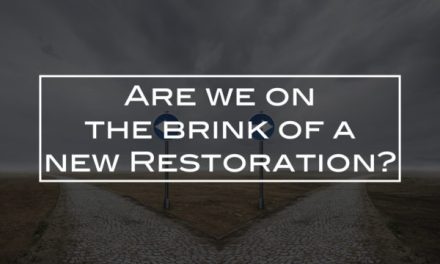“Follow your dreams.”
My fellow Millennials and I have heard this phrase our entire lives. We can “be anything we want to be.” While there’s a happy optimism and hopefulness to those sayings, it’s starting to seem as though they’ve greatly damaged this generation’s work ethic. Everybody wants their job to provide them with fulfillment and satisfaction. Many assume that they’re going to be rich, famous, or both, and that a job that is going to make them feel fulfilled and that they’re really making a difference in people’s lives is what they deserve and what they’ll eventually find. (No, this isn’t applicable to every Millennial. And no, it’s not a problem confined to just one generation. It’s simply one that is more prevalent in those entering today’s workforce.)
Here’s the truth so many need to face: you can’t become anything you want to be. 43 people in the history of the United States have been president. (Grover Cleveland served two separate terms, in case you’re thinking my math is off.) 31 men have won a Super Bowl championship as the starting quarterback. 549 people in human history have been into space. Very, very few people get to be pop stars, movie stars, or famous artists. Not many get to be world-changing philanthropists who do great things for thousands of people. And that’s okay. Once we come to grips with the fact that we’re not all created for those roles, we can start to focus on doing the best in whatever role we find ourselves and using our talents wherever God puts us.
But the issue doesn’t stop there. The overwhelming majority of us naturally have to accept that we aren’t going to be wildly rich and famous just by default. When you hit 20, 25, 30 years old, you start to figure out that that’s not how life is going to be. But that doesn’t mean the sense of entitlement just goes away. We’ve seen the rise of millennial experts who go around speaking and doing podcasts and YouTube videos about all the conditions Millennials need to survive and thrive in the workplace and society. In fact, the internet is filled with articles about what Millennials “need” from the workspace to make them satisfied with their job. Mental Floss, for example, shared an article on “The 5 Things Millennials Want From Their Employer” – to feel nurtured and have leadership opportunities, for their employers to share their values, for their employers to have a vision and positive impact, for people to come before profit, and more than just salary (like flexible hours).[1]
Getting those things is incredibly nice, and they make a job much more enjoyable… but why would someone need all of those conditions to take a job? What happened to just taking a job, putting your head down, and getting to work? All of this, though, is symptomatic of a larger, more spiritual problem.
In his book “Just Do Something” on how to pursue God’s will in your life, Kevin DeYoung wrote
Unfortunately, we’ve turned the idea of calling or vocation on its head. The Reformers emphasized calling in order to break down the sacred-secular divide. They said, if you are working for the glory of God, you are doing the Lord’s work, no matter whether you’re a priest or a monk or a banker. But we’ve taken this notion of calling and turned it upside down, so instead of finding purpose in every kind of work, we are madly looking for the one job that will fulfill our purpose in life. [2]
That last phrase – “We are madly looking for the one job that will fulfill our purpose in life” – that’s the one that gets to the very heart of the issue. “Follow your dreams” has led to work being idolized as the thing that will bring us joy and fulfillment and happiness, that all of our dreams will come true if we get into the right job with the right people. When we take that attitude, it’s no wonder that there’s such a hesitancy to “settle” for a decent job when the perfect one could be out there. Unsurprisingly, Millennials are three times more likely to job hop than previous generations as they go from place to place looking for the one role that will finally fulfill all of their desires. [3] (And, to be fair, idolatry of the job is neither new nor unique to Millennials. It’s simply far more pronounced.)
But labor is never going to fulfill us. It’s good for us, and it’s an important part of our lives, but the perfect work environment will still leave us feeling hollow. Solomon learned this lesson thousands of years ago. In Ecclesiastes 2:9-11 he looked back on his labor and the reward for it and concluded that it, like everything else this earth offers, was vanity. As C.S. Lewis put it, “We are half-hearted creatures, fooling about with drink and sex and ambition when infinite joy is offered to us.” He goes on to point out the foolishness of placing our hopes and dreams in things that are good, but not ultimate.
The books or the music in which we thought the beauty was located will betray us if we trust them; it was not in them, it only came through them, and what came through them was longing. These things-the beauty, the memory of our own past- are good images of what we really desire; but if they are mistaken for the thing itself, they turn into dumb idols, breaking the hearts of their worshippers.[4]
What we long for can come through our work, but never from it. If we idolize that perfect job, it’s going to let us down and break our hearts. But if we look at work as part of the whole, we can find fulfillment knowing that only God can provide that, and that He will work through us no matter the job. Work, at its core, is about God. It always has been.
DeYoung goes on to say, “Sometimes you feel a sense of calling to your job and, you know what, sometimes you don’t. You just work… We must all serve the Lord with heart, soul, strength, and mind wherever He’s placed us.” [5] Since when is there more shame in digging holes or flipping burgers than there is in sitting at home, refusing to do anything until the dream job comes along? Do we realize how ridiculous this is? It’s such a simple concept. No matter who you are, no matter where you find yourself, you do your job to the best of your ability, because you’re serving the Lord. Colossians 3:23 commands, “And whatever you do, do it heartily, as to the Lord and not to men” and Ecclesiastes 9:10 similarly says, “Whatever your hand finds to do, do it with your might.” We have to teach people to put work back in its proper place as a vital part of a thriving life but not the ultimate source of happiness. Hard work is a wonderful thing, ordained by God from the very beginning, but it can only bring true joy as part of a whole life in which God is the center.
For every David, Moses, or Abraham in the Bible, there’s a Ruth, an Andrew (who brought Peter to Jesus), or Epaphroditus (a man we only know as a dedicated servant of the Lord in Philippians 2). Once we realize that and that God can use us and give our lives purpose no matter where we find ourselves, we’re free to let Him use us as He sees fit, whether that’s as the President of the United States, or as literally any other type of employment. “Following our dreams” for our life’s fulfillment is no match for letting God be in control and use the talents He’s given us to His own glory.
By Jack Wilkie
[1] Abbey Stone, “The 5 Things Millennials Want From Their Employer,” February 1, 2016, Mental Floss, http://mentalfloss.com/article/74697/5-things-millennials-want-their-employers.”
[2] Kevin DeYoung, “Just Do Something: A Liberating Approach to Finding God’s Will,” Chicago, Moody Publishers, 2009. 101.
[3] Amy Adkins, “Millennials: The Job-Hopping Generation,” May 12, 2016, Gallup, http://www.gallup.com/businessjournal/191459/millennials-job-hopping-generation.aspx.
[4] C.S. Lewis, “The Weight of Glory,” New York: Harper Collins, 1949 (2001 edition). 26.
[5] Ibid. 31.
[6] DeYoung. 101.





